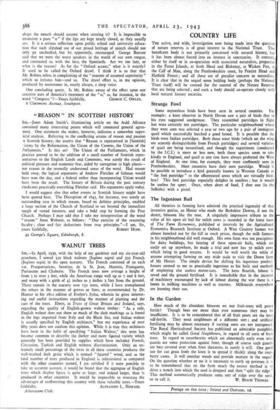THE active, and wide, investigation now being made into the
question of nature reserves is of great interest to the National Trust. This beneficent body is not primarily concerned with natural history, but it has been almost forced into an interest in sanctuaries. It controls, either by itself or in co-operation with associated naturalists, properties in the Fame Islands, at Scolt Head and Blakeney, at Wicken Fen, at the Calf of Man, along the Pembrokeshire coast, by Pentire Head and Hatfield Forest ; and all these are of peculiar concern to naturalists. It is clear that in the sequel some holding body (perhaps the National Trust itself) will be created for the control of the Nature Reserves that are being selected ; and such a body should co-operate closely with local natural history societies.
Strange Fowl Some mysterious birds have been seen in several counties. For example: a keen observer in North Devon saw a pair of birds that to his eyes suggested sandgrouse. They resembled partridges in flight but were certainly not partridges. The particular neighbourhood where they were seen was selected a year or two ago by a pair of immigrant quail which successfully hatched a good brood. It is possible that the birds were Indian partridges. Both these stout birds (which on the wing are scarcely distinguishable from French partridges) and several varieties of quail are- being naturalised, and though the experiment (conducted by the I.C.I.) is more or less new, both these species seem to take kindly to England, and quail at any rate have always preferred the West
o of England. At one time, for example, they were commonly seen in Pembrokeshire. Most countries have their own partridge. Would it be possible to introduce a bird generally known in Western Canada as " the fool partridge " to the afforestated areas which are virtually bird- less? This fool partridge especially delights in conifers ; but it would be useless for sport. Once, when short of food, I shot one (in the Selkirks) with a pistol.
The Ingenious Bail All theorists in farming have admired the practical ingenuity of that inventive genius, an Hosier who made the Berkshire Downs, if not the desert, blossom like the rose. A singularly impressive tribute to the value of his open air bail for milch cows is recorded in the latest issue of The Farm Economist, published at intervals by the Agricultural Economics Research Institute at Oxford. A West Country farmer was almost knocked out by the fall in stock prices, though the milk farmers in his neighbourhood did well enough. His own farm was too precipitous for dairy buildings, but hearing of these open-air bails, which are easily set up anywhere, he made a trial and now has so milch cows which bring in good returns. It would be well worth the while of anyone attempting farming on any wide scale to visit the Down farm of Mr. Hosier. The simple device for shifting his ingenious poultry- houses seemed to me as practically ingenious as his bails and methods
of employing else useless motor-cars. The hens flourish, labour is saved and the ground fertilised. It is remarkable that in the increase of machinery encouraged by lack of labour during the war there is a boom in milking machines as well as tractors. Milkmaids everywhere are learning their use.
In the Garden How much of the abundant blossom on our fruit-trees will prove fertile? Though bees are more than ever numerous they may be insufficient. It is to be remembered that of all fruit pears are the least self-fertile. They need neighbours of a different sort ; and artificial fertilising may be almost necessary if varying sorts are not juxtaposed. The Royal Horticultural Society has published an admirable pamphlet. which might be called Good Neighbours, in regard to all sorts of fruit trees. In regard to strawberries which are abnormally early even wire guards are some protection against frost, though of course such guards are best covered over when frost threatens, as surely it will. One good use for cut grass froin the lawn is to spread it thickly along the rasp- berry canes. It will smother weeds and provide manure in the sequel. On the question whether or no it is necessary to earth up potatoes it is to be remembered that on the farm much the easiest method is to drive a trench into which the seed is dropped and then " split the ridge This method automatically produces some sort of ridge over the seed, Postage on this issue : Inland and Overseas, Id.


























 Previous page
Previous page